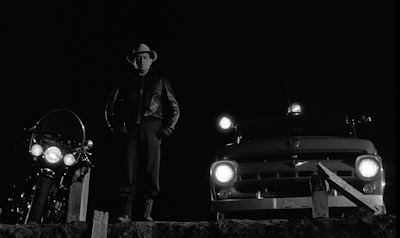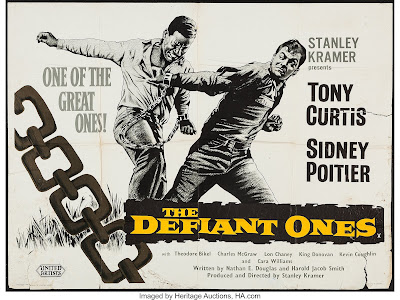The Defiant Ones, 1958
Director: Stanley Kramer
Writer: Nedrick Young, Harold Jacob Smith
Cinematographer: Sam Leavitt
Producer: Stanley Kramer
Starring: Tony Curtis, Sidney Poitier, Theodore Bikel, Charles McGraw, Lon Chaney, Jr., Cara Williams
Why I chose it
I had just heard about the death of icon Sidney Poitier at age 94, and immediately searched his filmography to see which of his films I hadn't seen, and this one from 1958 popped up. With the good reviews it garnered, it was the perfect choice.
'No-spoiler' plot overview
A prison van transporting convicts crashes in a rainstorm at night in the rural South. Most of the convicts are injured, but two, John Jackson (Tony Curtis) and Noah Cullen (Poitier), have escaped when the authorities respond to the crash. The catch: the two, one Black and one white, are chained together at the wrists and must work together to avoid capture. The swamps, rushing rivers, and cold rain that they deal with serve as metaphors for the racism that they must also confront to both become free. During their experience, John ("Joker") and Noah begin to form a bond that leads to some surprising choices. All along, we also follow the efforts of the local sheriff (Theodore Bikel) and a state police sergeant (Charles McGraw), whose inability to get along may hinder their efforts to capture the convicts.
 |
| Sheriff Muller (Theodore Bikel) surveys the wreckage that allowed two convicts to escape. |
Production Background
Aram Goudsouzian's excellent biography of Poitier, Sidney Poitier: Man, Actor, Icon, goes into great detail about this film. I learned that Poitier's participation in the 1959 film Porgy and Bess, a role that he didn't want, came about largely as a negotiation piece because he coveted the role of Noah in The Defiant Ones. The latter story he believed was much more relevant to the state of racial politics and true to Black dignity. It didn't hurt that Stanley Kramer, a socially progressive director, was helming the piece. Interestingly, Tony Curtis, who had made his reputation on lighter or comedic roles, copped the role of "Joker" over many others who Kramer had sought, like Marlon Brando, Frank Sinatra, Gregory Peck, and Burt Lancaster, and during filming Poitier praised Curtis to Kramer, helping him to be satisfied with the casting.
During filming, both men punished themselves during the rigorous scenes by rarely using stuntmen. At one point, the latter, when standing around waiting for the stars to finish their scene in the river, had to rescue them downstream when they got in a bit of trouble in the rapids!
The film became a critical and commercial hit after its premiere at the Berlin Film Festival in June 1958, where Poitier won Best Actor. He was presented with the trophy by Eleanor Roosevelt at her home in New York. Later, both Curtis and Poitier were nominated for Best Actor Oscars. The film also was an early step in breaking the blacklist, as its writer, Nedrick Young, one of those writers having refused to testify in front of the House UnAmerican Activities Committee (HUAC), won an Oscar for the screenplay. At first he was credited in the film with his pseudonym, Nathan E. Douglas, but when he revealed his involvement in the script prior to the Oscar ceremony, the Academy had to make an exception to their policy of not allowing awards for blacklisted writers.
Not surprisingly, the film didn't get shown in many places in the South because theater owners feared white backlash. And even in the Black communities, the reception was mixed, because of the sacrifices the script demands of Noah Cullen, which played better to white liberals. Ultimately Poitier was proud of the picture, but downplayed the script's role, and his, in making an impact toward greater societal goals. The Civil Rights Movement was not yet in full swing.
 |
| In a bit of recurring comic relief, King Donovan as Solly is always fussing over his dogs that he is loaning to the convict search. |
Some other notable film-related events in 1958 (from Filmsite.org):
- The number of drive-in theaters in the U.S. peaked near 5,000.
- Orson Welles' Touch of Evil (1958), with its breathtaking, three-minute, uninterrupted crane tracking shot under the opening credits, was the last of the film noirs in the classic period (from the early 40s to the late 50s). Universal was so unimpressed with the film that it was double-billed as the second B-movie film when first released, following the main feature The Female Animal (1958).
- The Best Picture-winning musical Gigi, directed by Vincente Minnelli, set a new Oscar record by winning nine awards. It remains one of the few films to win all the awards for which it had been nominated. It also has the shortest title of a film to win a Best Picture Oscar.
- A 21 year-old Jack Nicholson made his screen debut in producer Roger Corman's low-budget juvenile delinquent drama The Cry Baby Killer (1958).
- If anyone has any doubt that Poitier was a top-tier actor, I present this film as evidence. Two things stood out to me. First, his perfect accent and mannerisms convinced us that he could only be a Black man in the southern U.S. Remember, Poitier himself was born and raised in the Bahamas and spent his early adult years in New York City. Second, his line readings sparkle. Listen to his short speech to "Joker" bemoaning how as a Black man he would have to suppress any instinct to stand up to injustice; his wife would always remind him to "be nice." And every time he repeated the words "be nice," his pitch went up as he imitated his wife, making it a brilliant and believable little speech. Watch that speech in the clip below.
- Tony Curtis was excellent, too. He projected just the right blend of toughness, or rather "punk", and vulnerability that made his interactions with Poitier's character poignant. Yes, he's racist, but he's not a villain. What about that fake nose, though? Ugh! The makeup department added a prosthetic to his nose that was just enough to be noticed...and I was constantly distracted trying to determine if that really was his real nose or not. It turns out that it was used to make him look tougher and maybe uglier. Results are mixed.
Tony Curtis in profile: his nose looks like it may have been broken.
Nope, just the makeup department trying to make him look tougher.
- The script by Young and Smith, among other things, poignantly and unapologetically dealt with systemic racism. In the 21st century in which there is such an active discourse about the extent and power of systemic racism, I felt that the film could have been made so much more recently. The fact that it was made before the launch of the Civil Rights Movement in the U.S., is even more remarkable. There is a scene where Joker says, referring to a racial epithet, "I didn't make up those names!" Noah retorts: "No, you breathe it in when you're born, and you spit it out from then on." The visual representation of this truth happens later in the film where a young boy, roaming the fields with a gun, comes across the two prisoners and immediately assumes Noah is up to no good and Joker needs rescuing.
 |
| The men eat after Billy's reluctant Mom is told to feed Noah as well as Joker. |
 |
| Billy wonders what the white man must have done to be shackled together with a Black one. |
 |
| In small roles, Lon Chaney Jr., and Claude Akins discuss the lynching of the two convicts they caught trying to steal food. |
- With one major theme being "coming together as a team when forced to confront challenges together", I couldn't help but think of the various "wilderness experiences" that are designed for groups as varied as corporate executive teams and troubled adolescents, as a way of enhancing leadership, empathy and collaboration. This film was literally a "wilderness experience" for John and Noah, and it certainly had the desired effect.
- In this week's edition of 'Bit Player Bingo", I present Carl "Alfalfa" Switzer, in his final film role as one of the locals called out to hunt for the escaped convicts. He would sadly die a few months after filming as a result of an altercation with guns. Like many child stars, he gained fame and fortune early in life but then struggled as an adult.
Carl "Alfalfa" Switzer, with cap, center.
 |
| John "Joker" Jackson and Noah Cullen a little worse for wear after digging themselves out of a clay pit while shackled together. |





Although I'm a Poitier fan, I still haven't seen several of his biggest hits, including this one. I'm working on making up for that lack, as the library collection and my budget allows! The Defiant Ones really does seem like a movie I would totally dig. Soon!
ReplyDeleteIt seems we're in a similar situation, Rachel. I saw LILIES OF THE FIELD for the first time just last year. I have yet to see RAISIN IN THE SUN. I also haven't seen the one he did with Alan L., although it didn't get great reviews. I may still watch it, as an attempt to getting closer to seeing everything Alan ever did, and also appreciating Poitier's talent more.
DeleteI got Lilies of the Field from the library and am really enjoying it! Got about half an hour of it to finish tonight.
DeleteI saw Raisin in the Sun a couple years ago, and it was really powerful. I was glad I had read it in high school and remembered how it ended, though, or it may have been really stressful to watch that first time.
I have a recorded-off-tv copy of his movie with Alan, All the Young Men, and am kind of holding onto it as a carrot to reward myself with when I finish the rewrites on my current book. I expect I will enjoy it for both of them! I love that Poitier worked with so many of my favorites -- not only Ladd, but also Bobby Darin in Pressure Point), and both Glenn Ford and Vic Morrow in Blackboard Jungle.
I do love all Sidney Poitier films. Look Who's Coming to Dinner and A Patch of Blue are also must sees. I watch all Tony Curtis films a s well. Even his fluffy ones. Houdini with his wife, of course Some Like it Hot, Trapeze, where he also does airial stunts.They are powerful and loving in this film that finds our souls define us over exterior skin coverings. We are still all gods children of the human race. God Bless America allowing our freedoms to create art in film and more.
ReplyDelete